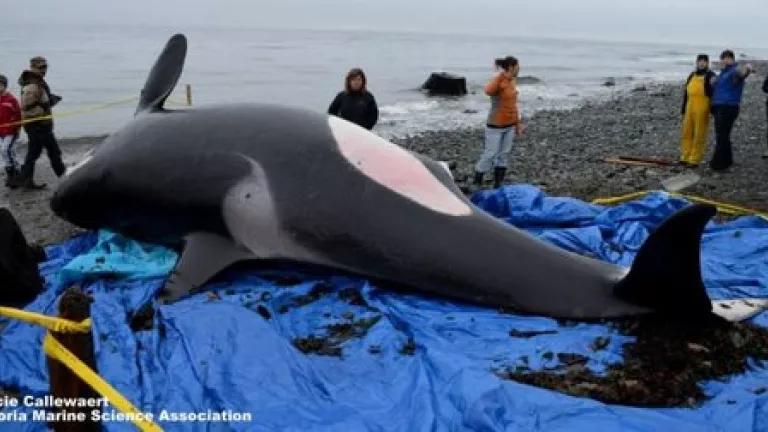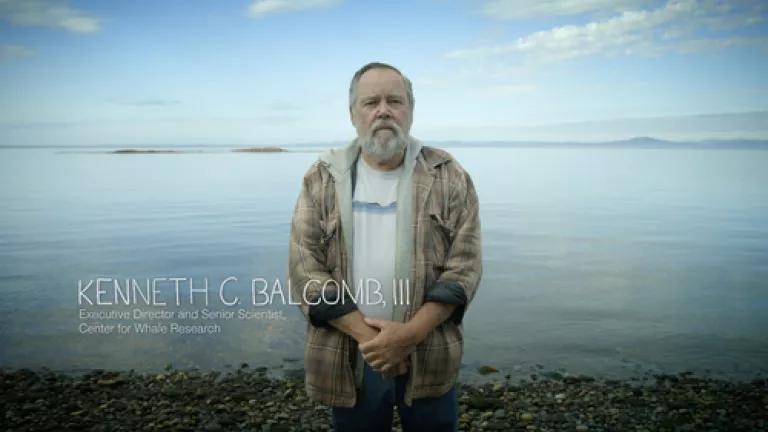
A year ago today, off the shores of British Columbia, a pregnant orca whale washed up dead. We don't know exactly what killed her, but we do know that Rhapsody was starving.
The Southern Resident killer whales are celebrities of the Puget Sound, with their own nicknames, personalities and stories. There's J2, known as Granny, who at 104 years old might be the oldest orca in the world. There's J42, or Echo, who's fond of playing with kelp. And then there was Rhapsody, or J32, nicknamed "The Breacher" for her frequent leaps over the waters of the Pacific Northwest.

Rhapsody (J32), left, with nephew Doublestuf (J34). Credit: Miles Ritter
Rhapsody was born in 1996 to J20 (aka Ewok), one of the few females of J Pod. Ewok died two years later, leaving Rhapsody in the care of her extended family. Her family banded together to raise her, as orcas often do, and she was frequently seen in the company of her Uncle J18 (Everett), and Aunt J22 (Oreo). Regular observers of J Pod took note of Rhapsody's apparent glee at breaching the water, calling her "exuberant," "vivacious," "the embodiment of joy."
Photos of Rhapsody breaching in early 2014 led to speculation that she was pregnant, bringing hope to a population that desperately needed it. The Southern Resident killer whales were listed as endangered in 2005, after decades during which scarce food, chemical contamination, ocean noise, and live capture for marine parks brought their numbers down to just 78. In August 2014, two whales in L Pod went missing, and the first calf born since 2012, L20, disappeared soon after.

Then, last December, Rhapsody washed up dead. A preliminary report prepared by Kenneth Balcomb, Executive Director of the Center for Whale Research, confirmed that she was carrying a near-full term female fetus that had died some time earlier and that she was malnourished. The preliminary report found that Rhapsody's blubber layer was "relatively thin and dry of oil ... consistent with inadequate diet for an extended period."
Southern Resident killer whales' preferred prey is the fatty "king" of salmon--Chinook. Chinook, like the orcas, are in deep trouble. This past summer, drought and impossibly hot river and reservoir temperatures in the Columbia River Basin are expected to have killed more than 250,000 salmon in June and July. A lack of Chinook salmon exacerbates other problems: if a whale can't find food, she will burn through fat reserves, metabolizing blubber where toxins are stored and harming immune and reproductive systems.These two endangered species' fates are intensely intertwined.
After years of heartbreak for the Southern Residents, this summer six new orca calves were born. However, at least four of them are males in a population that desperately needs future-mothers to help it grow. And these babies will need an adequate food supply too if they are going to make it. Robust Chinook salmon runs might have saved Rhapsody, and a healthy salmon population to feed on will help the six baby orcas born this year make it to adulthood. Bring back the fish, and more and more orcas will survive.
"There are not enough fish out here, the wild Chinook fish numbers are decimated. For these whales to survive we need to be concentrating more on wild stocks," said Deborah Giles, Research Director at the Center for Whale Research, when I spoke to her this morning.
Today is the one-year anniversary of Rhapsody's death. This year also marks the ten-year anniversary of the government's decision to protect these iconic species under the Endangered Species Act. Ten years from now, how many orcas will be left? How many whales will we see breaching above the waters of Puget Sound? Rhapsody embodied the joy and magnificence of the natural world. Her warning to us: we must act now.
This blog was written by my colleague, Julie Mendel, with only a little input from me. Kenneth Balcomb, III was recently featured in the NRDC and IFAW film "Sonic Sea" www.sonicsea.org.

